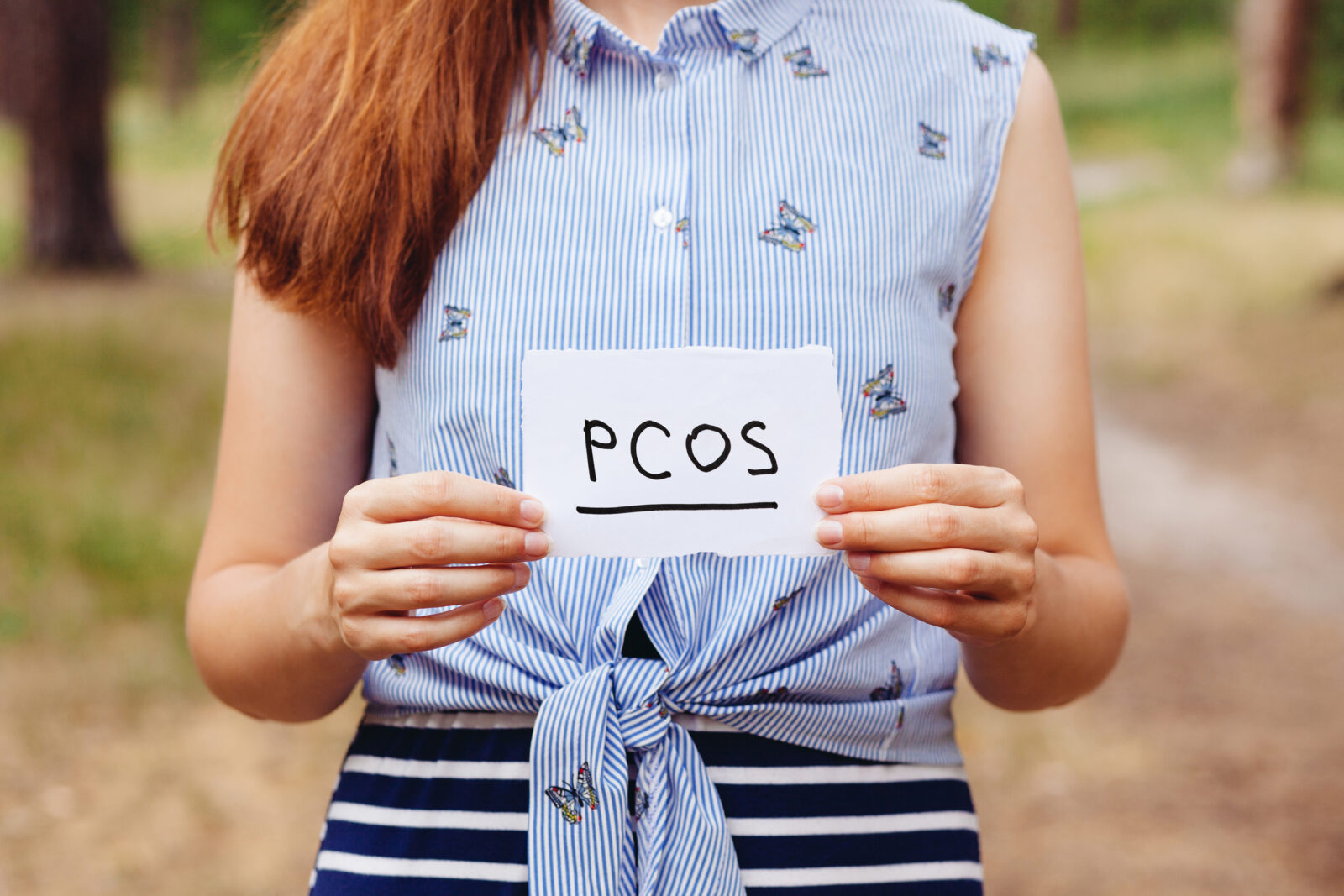If you’re navigating the often unpredictable waters of Polycystic Ovary Syndrome (PCOS), you’re not alone. With a range of PCOS symptoms like irregular periods, weight fluctuations, and mood swings, it’s a journey that can feel overwhelming.
But there’s hope on the horizon. Today, let’s delve into lifestyle changes and natural supplements that can help manage PCOS symptoms, bringing balance and wellness back into your life.
- What is PCOS and its symptoms?
- Does diet play a role in easing symptoms?
- Can lifestyle impact PCOS?
- Are there natural supplements for PCOS?
Understanding PCOS Symptoms
Polycystic ovarian syndrome (PCOS) is a common hormonal issue for women of childbearing age, first identified back in 1935. It affects about 8–13% of women. Surprisingly, up to 70% of these women don’t even know they have it. It’s a major reason for fertility issues due to irregular ovulation.
Do you experience the following:
- Irregular menstrual cycles
- Weight gain and difficulty losing weight
- Acne and skin issues
- Excessive hair growth or hair thinning
- Belly fat or weight gain
- Mood swings and mental health challenges
It’s important to rule out other conditions that look like PCOS, such as thyroid issues. Speaking with a healthcare professional for a thorough check-up and advice is best.
Unfortunately, PCOS often goes unnoticed and can take a long time to diagnose. It can be really frustrating and can worsen other health problems. Besides impacting fertility, PCOS can lead to long-term health issues. It affects both physical and emotional well-being.
It’s linked to several other health issues :
- Infertility
- metabolic syndrome
- high blood sugar levels or diabetes
- heart risks
- depression
- sleep apnea
- endometrial cancer
- liver problems
Understanding your health proactively, especially if PCOS runs in your family, is crucial to knowing how it might uniquely affect you.
Making Mindful Changes To Your Eating Habits
Food is more than just calories that fuel our bodies. Recent studies show that changing what you eat can make a big difference in managing PCOS symptoms. Women who shifted their diet saw improvements like weight loss and lower insulin. At the same time, they had lower testosterone levels and better overall health.
Specifically, eating more fruits and veggies with low glycemic index can help:

Also, drinking a moderate amount of red wine is okay. This kind of diet helps with PCOS symptoms. It also improves the health of your ovaries. Staying hydrated boosts these benefits even more.
Plus, this diet can positively change your gut bacteria, which is crucial because it’s linked to PCOS. Choosing the right foods might reduce inflammation and balance your hormones. Here’s how you can tweak your diet:
Low-Glycemic Foods
Experts found that a low glycemic diet can help manage PCOS. This isn’t just about easing symptoms. Examples are irregular periods, excess hair, or fertility issues. It’s more about boosting overall health. At the same time, it’s reducing long-term risks like heart problems or being overweight.
The best part? Following this diet might not only manage these symptoms. They could also prevent them, including lowering the risk of endometrial cancer.
Opt for whole grains, legumes, lentils, berries, and fresh leafy greens. These foods keep you full, regulate blood sugar, and even balance hormones.
Lean Proteins
Studies suggest high-protein meals can lower insulin levels and male hormone effects. They also help in reducing appetite. It’s great for managing weight. Studies show that diets with at least 25% protein can lead to weight loss. At the same time, it leads to lower BMI and reduced waist size.
Plus, they improve insulin sensitivity and blood lipids, which are vital in managing PCOS. Interestingly, high-protein diets also seem to help with mood and self-esteem. So, you may include fish, chicken, and plant-based proteins in your meals.
Healthy Fats
The type of fat in your diet matters. Experts suggest eating more monounsaturated fats (like olive oil) and polyunsaturated fats (like walnuts and fish) can be beneficial. High-fat meals might lower testosterone levels. But, choosing the right kind of fat is vital. Saturated fats, often found in junk food, can worsen insulin resistance and inflammation.
Balancing fats with lower carbs could be a smart move for managing PCOS symptoms. Remember, it’s all about choosing healthier fats and keeping the carbs in check! Incorporate avocados, nuts, and olive oil for hormonal balance.
Adjusting Your Lifestyle To Reduce PCOS Symptoms
Lifestyle changes are essential but not a complete substitute for medical treatment! Regular exercise, maintaining a healthy weight, and eating well are crucial for managing metabolic issues associated with PCOS.
Also, prioritizing mental health and overall well-being is important, even though it’s not an instant fix. Your lifestyle choices significantly impact your PCOS symptoms. Consider the following:
Move Your Body
The 2018 PCOS guideline suggests at least 150 minutes of moderate or 75 minutes of vigorous exercise per week to prevent weight gain. Aim for 250 minutes of moderate or 150 minutes of vigorous physical activity weekly for weight loss. Also, reduce sitting time and include strength training twice a week.
Studies show that exercise significantly improves insulin levels, cholesterol, body fat, and fitness when supervised and in the short term. Aerobic exercise helps reduce body fat and improve heart health. Moreover, resistance training is excellent for reducing waistline and building muscle.
Combining diet with vigorous exercise seems to be more effective than exercise alone for improving BMI and insulin resistance. And interestingly, exercise can improve menstrual regularity and ovulation more than diet alone. Remember, finding the right mix of exercise that works for you is key in managing PCOS symptoms.
Practice Yoga
Yoga is recommended for PCOS as it’s a moderate physical activity that also offers the benefits of mind-body therapy. Research on its full range of benefits is ongoing. For one, recent studies have shown some promising results.
A systematic review found that yoga can help with psychological, reproductive, and metabolic issues in PCOS. Specifically, it can decrease symptoms like excessive hair growth and menstrual irregularities. It can potentially improve blood sugar and insulin levels.
Plus, doing yoga regularly might help reduce waist and hip size. It’s a great way to combine physical activity with stress relief and overall wellness.
Manage Your Stress
Did you know that women with PCOS have higher levels of stress hormones? Researchers found that stress hormones cortisol and DHEA are elevated compared to women without PCOS. This suggests stress might play a big role in PCOS symptoms.
Focusing on stress reduction could help in managing PCOS. It’s not just in easing current symptoms but also preventing further complications. For example, researchers found that mindfulness-based stress reduction (MBSR) helps lower worry and stress levels.
This approach, involving mindfulness and meditation practices, significantly reduced concerns about PCOS-related physical issues. It’s not just about managing PCOS symptoms. It’s also about improving overall mental health and quality of life. So, incorporating mindfulness practices into your routine could reduce stress and enhance well-being.
Get Enough Sleep
Have you been counting sheep lately? Women with PCOS are more likely to experience sleep issues. It includes sleep apnea and general sleep disturbances. This is partly due to hormonal imbalances affecting sleep-regulating neurotransmitters and body temperature at night.
According to experts, women with PCOS are more likely to have sleep apnea. It’s a condition when your breathing stops and starts. Additionally, sleep problems can worsen PCOS symptoms, creating a bit of a cycle.
Even without being diagnosed with sleep disorders, many women with PCOS struggle with poor sleep quality. They also have problems falling asleep and feeling rested. Managing sleep is a vital part of handling PCOS effectively. Getting 7-8 hours of sleep every night could regulate hormones.

Exploring Natural Supplements For PCOS Symptoms
Nature offers several options to help manage PCOS symptoms. Alongside a balanced diet for managing insulin in PCOS, adding herbal infusions can be a boost. Herbs like aloe vera, cinnamon, green tea, chamomile, white mulberry, and marjoram can positively impact your lipid profile, blood glucose, and insulin resistance.
These herbs benefit all types of PCOS thanks to their ability to regulate fat lipid and carbohydrate metabolism. Some of them, like green tea and marjoram, can also improve hormonal levels, ovarian health, and insulin sensitivity. They provide antioxidant and anti-inflammatory benefits as well. It’s a natural way to complement your PCOS management plan.
Also, certain herbs can be helpful for women with PCOS, especially those with high androgen levels. For instance, green mint and licorice root have anti-androgen effects. They help with hormonal balance and reduce symptoms like hair loss.
Other herbs like flaxseed, turmeric, nettle, and Vitex agnus-castus are also beneficial. They work by managing oxidative stress, inflammation, and hormonal imbalances. For those dealing with PCOS and metabolic syndrome, herbs like milk thistle and black cumin can protect liver health.
Additionally, berberine (BBR), a plant extract, shows promise for PCOS with fewer side effects than some traditional drugs. It works mainly by improving insulin resistance, a core PCOS issue.
Studies suggest BBR helps lower androgen levels. At the same time, it manages fat or lipid metabolism and reduces chronic inflammation. It influences PCOS through key pathways like PPAR, MAPK, and AMPK. Interestingly, its effectiveness can be enhanced when combined with medicines ike metformin.
These natural supplements may offer support. Discussing any natural supplements with your healthcare provider is always wise. They can help you find the right approach for your unique needs.
Frequently Asked Questions
Question 1: Can diet and lifestyle changes alone manage PCOS symptoms?
While they play a significant role, combining lifestyle changes with medical advice for comprehensive management is important.
Question 2: Are there any specific exercises recommended for PCOS?
A combination of aerobic activities, strength training, and yoga can be beneficial in managing PCOS symptoms.
Question 3: How can I start incorporating these natural supplements into my daily routine?
egin with small, sustainable changes in diet and lifestyle, and gradually introduce herbal supplements as needed. But first, speak with a healthcare professional before taking natural supplements.
Key Takeaways
- Add more low-glycemic foods like whole grains, legumes, and fresh greens. Lean proteins are great, too. They help lower insulin and testosterone levels, manage weight, and uplift mood. Don’t forget healthy fats like olive oil and nuts. They can potentially balance hormones and reduce inflammation.
- Lifestyle changes are crucial alongside PCOS medical treatment. Exercise is helpful. Aim for at least 150 minutes of moderate or 75 minutes of vigorous activity weekly. Yoga is a great option, too. It offers both physical and mental health benefits. Mindfulness and meditation can significantly lower stress and improve your overall well-being. And remember, quality sleep matters! So aim for 7-8 hours nightly to help regulate your body.
- Aloe vera, cinnamon, green tea, and berberine can be a big help in managing your PCOS symptoms. Berberine is a standout when it comes to natural supplements for PCOS. It’s known for improving insulin resistance, weight, and hormonal balance. Plus, it’s got anti-inflammatory benefits, too. Consult your healthcare provider to integrate natural supplements into your PCOS management plan safely.















Leave a comment